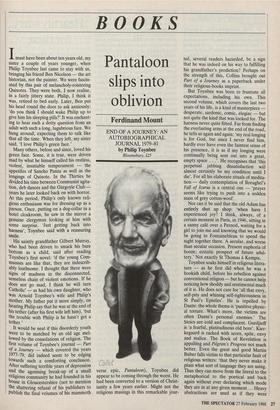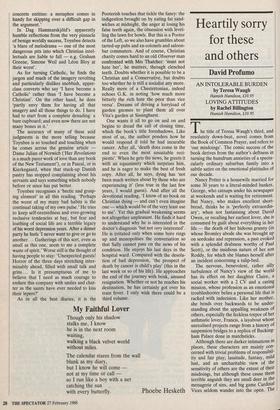BOOKS
Pantaloon slips into oblivion
Ferdinand Mount
END OF A JOURNEY: AN AUTOBIOGRAPHICAL JOURNAL 1979-81 by Philip Toynbee Imust have been about ten years old, my sister a couple of years younger, when Philip Toynbee last came to stay with us, bringing his friend Ben Nicolson — the art historian, not the painter. We were fascin- ated by this pair of melancholy-roistering Quixotes. They were both, I now realise, in a fairly jittery state. Philip, I think it was, retired to bed early. Later, Ben put his head round the door to ask anxiously: 'do you think I should wake Philip up to give him his sleeping pills?' It was enchant- ing to hear such a dotty question from an adult with such a long, lugubrious face. We hung around, expecting them to talk like that all the time. When they left, my sister said, 'I love Philip's green face.' Many others, before and since, loved his green face. Some, it is true, were driven mad by what he himself called his restless, violent, insatiable temperament — the appetites of Sancho Panza as well as the longings of Quixote. In the Thirties he divided his time between Communist agita- tion, deb dances and the Gargoyle Club years he later looked back on with horror. At this period, Philip's only known reli- gious enthusiasm was for dressing up as a parson. Once, putting on a dog-collar in a hotel cloakroom, he saw in the mirror a genuine clergyman looking at him with some surprise. 'Just getting back into harness', Toynbee said with a reassuring smile.
His saintly grandfather Gilbert Murray, who had been driven to smack his bare bottom as a child, said after reading Toynbee's first novel: 'if the young Com- munists are like that, they are indescrib- ably loathsome. I thought that there were signs of madness in the disconnected, senseless chain of violent emotions. If he does not go mad, I think he will turn Catholic' — as had his own daughter, who was Arnold Toynbee's wife and Philip's mother. My father put it more simply, on hearing Philip say that he was at the end of his tether (after his first wife left him), 'but the trouble with Philip is he hasn't got a tether.'
It would be neat if this disorderly youth were to be matched by an old age mel- lowed by the consolations of religion. The first volume of Toynbee's journal — Part of a Journey — which covered the years 1977-79, did indeed seem to be edging towards such a comforting conclusion. After suffering terrible years of depression and the agonising break-up of a small religious community he had founded in his house in Gloucestershire (not to mention the shattering refusal of his publishers to publish the final volumes of his mammoth verse epic, Pantaloon), Toynbee did appear to be coming through the worst. He had been converted to a version of Christ- ianity a few years earlier. Might not the religious musings in this remarkable jour- nal, several readers hazarded, be a sign that he was indeed on his way to fulfilling his grandfather's prediction? Perhaps on the strength of this, Collins brought out Part of a Journey as a paperback under their religious-books imprint.
But Toynbee was born to frustrate all expectations, including his own. This second volume, which covers the last two years of his life, is a kind of masterpiece desperate, sardonic, comic, elegiac — but not quite the kind that was looked for. The harness never quite fitted. Far from finding the everlasting arms at the end of the road, he tells us'again and again: 'my real longing is for God, but since I never find him, hardly ever have even the faintest sense of his presence, it is as if my longing were continually being sent out into a great, empty space . . .'. He recognises that 'this perpetual jabbing dissatisfaction will almost certainly be my condition until I die'. For all his elaborate rituals of medita- tion — daily contemplation of Breughel's Fall of Icarus is a central one — 'prayer seems like trying to push into a sodden mass of grey cotton-wool'.
Nor can it be said that the old Adam has entirely shut up shop: 'when have I experienced joy? I think, always, of a certain moment in Paris, in 1946, sitting in a sunny café over a Pernod, waiting for a girl to join me and knowing that we would be going to Fontainebleau to spend the night together there. A secular, and worse than secular occasion. Present euphoria of booze; ecstatic prospect of future adul- tery.' Not exactly St Thomas a Kempis.
Toynbee soaks himself in religious litera- ture — as he first did when he was a bookish child, before his rebellion against conventional religion — but he cannot help noticing how shoddy and sentimental much of it is. He does not care for 'all that envy, self-pity and whining self-righteousness in St Paul's Epistles'. He is repelled by Dante: the whole theme is 'punitive physic- al torture. What's more, the victims are often Dante's personal enemies.' The Stoics are cold and complacent. Gurdjieff is 'a fearful, platitudinous old bore'. Kier- kegaard is racked with scorn, spite, envy and malice. The Book of Revelation is appalling and Pilgrim's Progress not much better. Even the great and good Martin Buber falls victim to that particular fault of religious writers: 'that they never make it plain what sort of language they are using. Thus they can move from the literal to the metaphorical to the poetical and back again without ever declaring which mode they are in at any given moment ... Heavy abstractions are used as if they were concrete entities: a metaphor comes in handy for skipping over a difficult gap in the argument.'
In Dag HammarskjOld's apparently humble reflections from the very pinnacle of benign worldly success, Toynbee detects 'a blare of melodrama — one of the most dangerous pits into which Christian intel- lectuals are liable to fall — e.g. Graham Greene, Simone Weil and Leon Bloy at their worst'.
As for turning Catholic, he finds the jargon and much of the imagery revolting and particularly dislikes snobbish, upper- class converts who say 'I have become a Catholic' rather than 'I have become a Christian'. On the other hand, he does `partly envy them for having all that imagery and all those things to do. I have had to start from a complete denuding: a bare cupboard; and even now there are not many bones in it.'
The accuracy of many of these acid judgments is the more telling because Toynbee is so touched and touching when he comes across the genuine article Dame Julian of Norwich (`Her Revelations is a much purer work of love than any book of the New Testament'), or in Pascal, or in Kierkegaard, when that stuck-up Danish pastry has stopped complaining about his servants and says something which nobody before or since has put better.
Toynbee recognises a 'hectic and grasp- ing element' in all this reading. 'Perhaps the worst of my many bad habits is the continual taking of my own pulse.' He tries to keep self-centredness and ever-growing reclusive tendencies at bay, but fear and loathing of social life are a terrible legacy of his worst depression years. After a dinner party he feels 'I never want to give or go to another... Gatherings of this sort, even as small as this one, seem to me a complete waste of spirit.' Worse still is the thought of having people to stay: 'Unexpected guests! Horror of the three days stretching inter- minably ahead, filled with small talk and grins ... Is it presumptuous of me to believe that I need as much courage to endure this company with smiles and chat- ter as the saints have ever needed to kiss their lepers?'
As in all the best diaries, it is the Pooterish touches that tickle the fancy: the indigestion brought on by eating fat sand- wiches at midnight, the anger at losing his false teeth again, the obsession with level- ling the lawn for bowls. But this is a Pooter of the Left, so we also have grumbles about tatted-up pubs and ex-colonels and saloon- bar commuters. And of course, Christian charity comes hard to an old Observer man confronted with Mrs Thatcher: 'must not hate her', he mutters, through clenched teeth. Doubts whether it is possible to be a Christian and a Conservative, but doubts too whether he is still a socialist any more. Really more of a Chestertonian, indeed echoes G.K. in noting 'how much more bitterly the rich hate the poor than vice versa'. Dreams of driving a lorryload of garden gnomes to plant them all over Vita's garden at Sissinghurst.
One wants it all to go on and on and begins to dread the call of closing time, which the book's title foreshadows. Like most of us, the author ponders how he would respond if told he had incurable cancer. After all, 'death does come in the end to even the most unsuitable reci- pients'. When he gets the news, he greets it with an equanimity which surprises him, and he is eager to make the best of fresh copy. After all, he says, dying has 'not been much written about by those who are experiencing it' (less true in the last few years, I would guess). And after all the devotional reading, 'I know of no book on Christian dying — and can't even imagine one — which would be of the very least use to me'. Yet this gradual weakening seems not altogether unpleasant. He finds it hard to understand why he is interested in the doctor's diagnosis 'but not very interested'. He is irritated only when some bore rings up and monopolises the conversation so that Sally cannot pass on the news of his condition. He enjoys his last days in the hospital ward. Compared with the desola- tion of bad depression, 'the prospect of death by cancer is child's play' (this in the last week or so of his life). He approaches the end of the journey with brisk, amused resignation. Whether or not he reaches his destination, he has certainly got over his train fever. I only wish there could be a third volume.



















































 Previous page
Previous page